#and what they mean for how ollie and roy each see themselves and their relationship
Explore tagged Tumblr posts
Text
My absolute favorite genre of comics meta is the type that looks at inconsistencies between runs and instead of treating them as mistakes, leans deep into what they tell us about how the characters view their own stories.
This is what makes comics fandom so fascinating to me, because the medium stretches single stories across so many different generations of readers and writers and artists. You can double down on one particular interpretation of a character (One True Character TM), or you can take the messy histories full of visions and revisions and let them reflect the way memories and understandings change over time. How the truth of our pasts becomes increasingly inaccessible to us, replaced by our own interpretations and retellings. How none of us really can ever access the objective.
There's just so much opportunity for storytelling in those gaps and inconsistencies, and I love seeing it laid out like this.
@disco-troy and i were talking about it... but one of the things that really breaks my heart is how it's both dick and bruce who are such unreliable narrators. consider donna's wedding...
in tales of the teen titans (1984) #50, we have dick asking bruce why he adopted jason and not dick:


what's really interesting about it is the way dick is depicted here... the refusal to make eye contact till he eventually does. there's an element of dick being terrified of bruce's answer and his posture in the beginning of this interaction is almost... defensive? he's hunched, leaning on the balustrade, shadowed... till he receives assurance from bruce. and then, bruce immediately reverts to toasting the success of dick's team... which dick reciprocates but i feel like there's possibly still a degree of doubt from him... about dick grayson's role in bruce wayne's life (because yes, bruce has affirmed that he loves dick as much as any son but it doesn't take away from the fact that jason was adopted instantly and dick is only adopted after tim appears... we've seen how dick reacted to both the times bruce was considering adopting someone else— tim and cass— and it isn't pleasant!!! which means there's still lingering unease about it for him)
and then you have justice league of america (2006) #0, which is a series of flashbacks and future occurrences woven to focus on the trinity. but here's bruce's recollection of this talk at donna's wedding:

there's such a difference between the two!!!
here, it's almost a role reversal... dick is the one reassuring bruce and reiterating the importance of their familial bond... even the physicality of reassurance is from dick to bruce through the hand on the shoulder. despite the similarity in postures between this and the panel from tales, dick is not afraid to meet bruce's eyes— in fact, he's the one who takes it a step further and offers physical reassurance along with the verbal. moreover, the conversation is cut short by dick being pulled away for other obligations... which is an interesting consideration of how bruce has often viewed dick's priorities being split between him and the titans.
of course, we can chalk it up to different things— maybe this part of dick and bruce's conversation actually happened and we simply didn't get to see it in TotTT + it's not always possible for writers of different comics to have the exact same considerations for characters + dick is arguably the focus in tales whereas bruce is the focus in JLA so it makes sense for the narration to pander to them in their respective comics.... but there's also the fact that this is very much a flashback whereas the conversation in tales is happening in the present...
we already know dick & bruce are prone to miscommunication when the communication even happens + bruce is often painfully nostalgic about dick's robin years... so i don't think it's a stretch to say that bruce's recollection of this conversation is warped by his own emotionality.
especially when you consider the handling of robin being passed on to jason. in the very same JLA issue, this is how bruce talks of it:


which is, once again, very different in terms of how that conversation actually went in batman (1940) #416:

(although, i would be remiss if i didn't consider that bruce probably thinks he is being truthful here... because we do see how dick accepts jason as robin. moreover, bruce himself sees it and is grateful to dick for it)

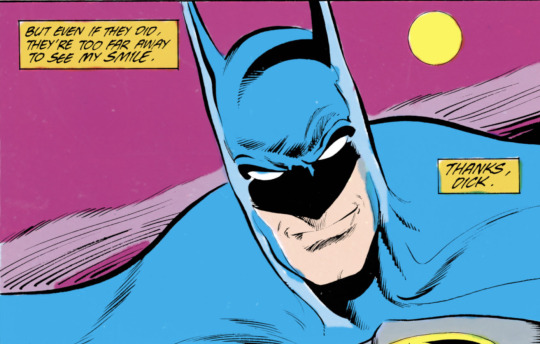
but i think it's interesting how in both cases, bruce is a first-hand spectator to dick's unease/hurt/fear of rejection... and how differently he remembers it... perhaps, even chooses to remember it.
like, just look at this... right after dick & bruce's conversation in JLA, this is what follows:

it's so interesting that he remembers his own sadness and nostalgia at the kind of man dick has grown to be... how that is, in his mind, at a distance from him... how he remembers being the one receiving reassurance and affirmation of his importance to dick from dick... and all of this, maybe, comes at the cost of dick's feelings being diminished & considered with less gravity.
tldr: bruce wayne... you are so deeply unwell!!! you sure are... a Father.
#I just love this kind of analysis#dick and bruce in particular have so many of these rich inconsistencies in story#all of the older superheroes honestly#somewhere on my hd i have a massive guy-with-strings.jpg file tracing the different retellings of Snowbirds#and what they mean for how ollie and roy each see themselves and their relationship#comics meta#dick & bruce#dick grayson#bruce wayne#batfam meta
371 notes
·
View notes
Text
let’s talk about snowbirds don’t fly for a second, shall we: the arc where roy’s addiction was first introduced, and how it actually affected the relationship between roy and ollie.
people’s perception of snowbirds don’t fly and the events surrounding it is so... weird, to the point where it often makes me wonder whether they’ve actually read the comic (and roy’s appearances right after, but i realize those might be less known) or whether they’re just going off a few very specific panels and inaccurate recounts – usually from people that will twist anything in their favour to call ollie a bad guy.
because, if you pieced together what most people seem to think happened – and this is what i was expecting to find once i decided to read it myself –, in snowbirds we should see: roy, not yet an adult and still under the active care of ollie, starts using drugs, and oliver’s so caught up in himself and negligent that he doesn’t notice what’s happening. when he finally finds out, he lashes out, hits roy and kicks him out of the house, leaving roy without a home. this makes their relationship crumble, and roy starts hating ollie because of it. they don’t speak to each other, and leave in awful terms.
and... in many aspects, that’s so far from the events you'll see if you actually go read green lantern #85 (snowbirds don’t fly) and #86 (they say it’ll kill me... but then won’t say when!). i’m assuming a lot of misconceptions happen because of a) writers with a grudge against ollie who retroactively, and unfairly, painted him in a bad light, and people took this at face value, and b) retcons that came with the new 52 reboot – but, i'll be honest, i don’t care enough to go read that mess even for this post. in general, i’m pretty sure we all agree that we ignore out of character comics; let’s not make roy and ollie the exception to that, yeah?
first i want to get something out of the way, that i feel like i need to mention even though there’s probably people that have talked about it better than i could. when we analyze this comic we should keep in mind that the characters in the story were meant to fill specific roles for the sort of... PSA comic that dc was trying to make, and in the 70s, at that. considering this, both roy and ollie are plot devices.
the creative team behind the story (o’neil and adams) have said that they chose roy to be the average “good” teen who fell into drugs – as a way to say “this could happen to anyone, even to this reputable superhero”. ollie was the caring but imperfect parent who missed the signs – not abusive but distant at the moment, he was meant to be more like a nudge to parents to pay closer attention. it was written to play as a sort of “this could happen to the best of us” situation. and in that context, ollie is made to react in a way that is at most "not ideal" for the standards of its time: he hits roy, and denies to himself that roy’s addiction is a real problem that needs to be dealt with delicately. this is used to send the message of “don’t react like this”.
that isn’t exactly the point of this post, and i don’t want to downplay the harm ollie did with his reaction or absolve him of any blame. the point of this post is: people seem to think that’s where the storyline ended, that was ollie’s final reaction, and those are the terms in which ollie and roy parted; which is just not true.
instead, ollie hitting roy happens in the very first page of green lantern #86 – we have an entire issue in which ollie is faced with his initial reaction and made to confront his mistake (which is more than we can say for, um, other father superheroes that have hit their children. i won’t name names.) the only moment you could read as him “kicking roy out” – which is the phrasing i’ve seen applied to this – happens the very next page, where ollie tells roy to “get out”.
the thing is, roy was not living with ollie at the moment. there was nowhere that ollie could kick him out from. “get out” means just that: get out of this room (and ollie didn’t intend anything more than that with his words.) the comic makes a point of stressing that roy is, by that point, independent, and old enough to be living without a guardian.
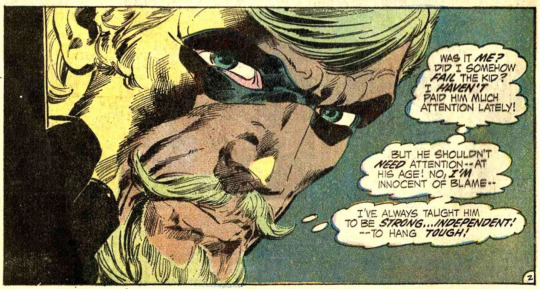
ollie, right after roy leaves, thinks: “but he shouldn’t need attention–at his age”. ollie is in the wrong here because of his close-minded view of addiction and because he’s not considering that, though a legal adult, roy is still young and needs care, but it still shows that roy was largely on his own by then. ollie’s reaction is definitively negative and a rejection, but can’t in any way be seen as “kicking roy out”, because it isn’t. (note, also, how ollie’s first thought is that he failed roy, but his denial and stubbornness get in the way and he shifts the blame. he’ll eventually have to get over this and change.)
we see that ollie plays the role of the father that reacts poorly, and he is directly contrasted with the adults who do take responsibility for roy – hal at first, and dinah after, are the ones who play the role of “this is how you should react.”
hal finds roy without knowing what happened between him and ollie, and his first reaction is to take roy to a doctor; he immediately recognizes that what roy needs is help – and will later say so to ollie. when roy refuses, saying he wants to kick the addiction on his own – to prove himself to ollie, because even though he doesn’t think ollie was right he still values his opinion and their relationship, but i’d say there’s something he’s trying to prove to himself, too –, hal recognizes that he doesn’t know anything about drug withdrawal or addiction, and he’s receptive to roy, asking him questions and listening without judgement.
so he takes roy to dinah, who is the one that (very kindly, might i add, because dinah and roy weren’t that close at the time) cares for roy while he goes cold turkey. roy, possibly rather unrealistically, though i’m no expert, kicks the addiction in the span of a few pages. before the ending of this arc, roy has already gone clean.
there’s a one week timeskip there, where we assume that out of the characters featured in this story, roy only interacts with dinah, and ollie’s been with hal. then, before the conclusion of this story, roy is given a place to confront ollie and call him out for his mistakes. roy calls him out for turning his back on him, and he gets to tell him – and show him, punching him in a scene where it’s implied that ollie completely deserves it, unlike the opposite situation that this issue started with – about the pain he’s been in. we are given, in text, a moment where roy can express to ollie what he’s been going through, what he did wrong, and how it affected him.
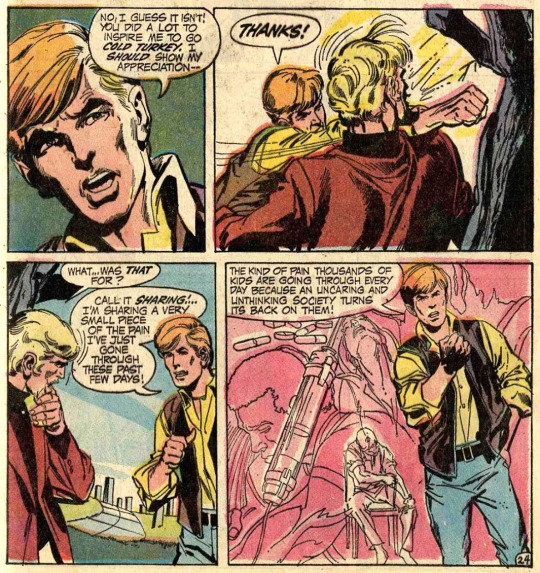
(this is a moment where the intentions of the comic are very clear, not only because roy practically turns to the camera to deliver the PSA, but also because of the wording: roy told ollie that he turned his back on him, and in the same page he talks about society turning its back on drug addicts, same wording twice. ollie and roy are both meant to represent something other than just themselves, even if this happened in continuity and ended up affecting their characters in the long run.)
and ollie – unlike in that first page, now ollie is shown to listen and understand. he’s not in the same place or mindset he was in when everything started. in the beginning, ollie thought that there must be something inherently bad about a person who does drugs, in a reflection of society’s – and parents’ – views of the issue. and that shows in his initial denial and reaction: ‘how could my son, who’s a good person, do this?’ then, in this scene, when roy tells him he beat the addiction, he answers “good boy” – roy immediately rejects this notion, and emphasizes that there’s more to it than his own goodness: what’s important is the help he received, namely from hal and dinah, and a caring environment. ollie, at the very least, begins to understand this, and in doing so understands very clearly what he needs to change about their relationship if he wants roy back.
this means that ollie starts undergoing character development in this one issue alone. the thing about ollie, in regards to his relationship with roy, is that he has made mistakes and the narrative acknowledges it; but, when well written, he realizes and admits it, making a point of learning from his mistakes. roy knows that ollie has fucked up, too, and doesn’t let him off the hook for it, but he also recognizes that he makes an effort to be better. especially after snowbirds, this informs their relationship a lot.
by the end of the issue they’re not hugging, and roy is leaving on his own, but that’s completely of his own accord. and these are the last panels in the entire issue:
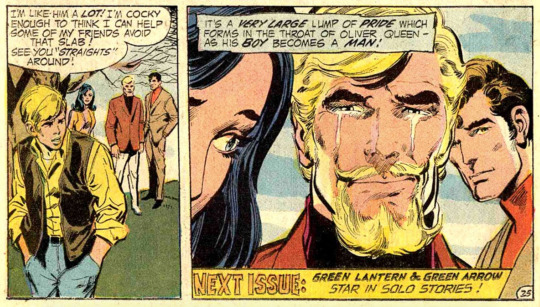
the whole original comic, but mostly these panels specifically, is what makes me wonder about people’s perception of these events, and the misconceptions i previously mentioned – because i really am confused as to how you could reconcile these two opposite readings. unless, you know... people are speaking without ever touching the original comic. (i don’t want to blame anyone for not reading older comics, but please, if you’re gonna speak, especially if it’s to shit on a character or call them abusive the way people do with ollie, do it in an informed way.)
so, right after the events of snowbirds, because roy was allowed to speak up and ollie was made to listen, at least as much as can be expected through his stubbornness, they’re in much better terms than people usually think. if you look at roy’s chronology, he interacts with ollie in his next few appearances (barring the teen titans ones), teaming up as they normally would, with the one difference being the emphasis that’s put into the fact that roy has grown away from ollie – in the same way as any young adult would grow away from a parent. there’s also roy’s resentment for ollie’s actions, but this resentment is portrayed as deserved and it doesn’t turn their interactions into something negative. it’s still clear that they both care for each other, and there’s certainly no hate.
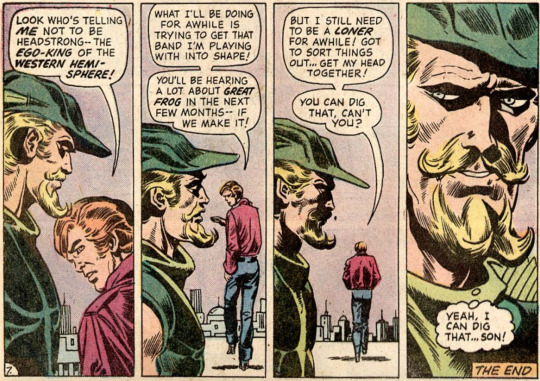
[from action comics #436/2]
this first one takes place a few months after roy goes his own way. roy is in the middle of working a case when ollie gets involved, and they work on it together. green lantern #100/2 is their next appearance and has a similar plot, this time with dinah working with them as well. in both of these, they still work well together, are able to communicate in action and have each other’s backs.
in the action comics issue, ollie insists that roy is still welcome by his side, and that he should still feel free to ask for help whenever he needs it. roy refuses in the way that’s shown in the panels above – saying that he needs to “be a loner for a while” and build a life of his own (though it’s not an exact parallel, because ollie is ollie and takes “loner” to a whole other level, the wording here reminds me of the way ollie tends to leave on his own whenever he feels like he needs to find himself). you’ll see that these interactions aren’t hostile at all – quite the opposite.
world’s finest #251/3 might be the one where their interactions are the most tense, and that’s mostly just in the end. when they’re done with the usual superhero team-up, ollie shows willingness to talk to roy:
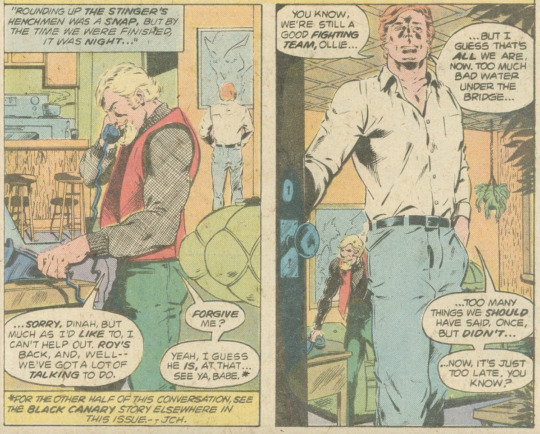
“i can’t help out. roy’s back, and, well– we’ve got a lot of talking to do.” through these issues, we realize that ollie has learned: his previous mistake was not paying enough attention to roy, and not showing him that he could always count on ollie (both in noticing roy’s addiction, but also before, in not taking enough care so roy wouldn’t get to that point). he tries to make up for it every chance he has, but it’s always on roy’s terms. everyone is aware that ollie is the one who was in the wrong, and it’s up to roy to forgive him or not, but no one ever pressures roy to do so. when roy doesn’t want to stay and talk, ollie accepts it.
ollie atones again and again, and their relationship isn’t magically fixed and they don’t go back to being close without effort – effort which rightfully has to be done, again, mostly on ollie’s part. but they never, ever go so far as to hate each other.
then, in green arrow (1988) #75, ollie feels so bad about what happened between them, about the way he screwed up, he essentially says to roy that he wouldn’t fault him for wanting to shoot him. “so go ahead. god knows, you’ve got plenty of reason.” roy has been brainwashed here; he breaks through it because of ollie’s words.
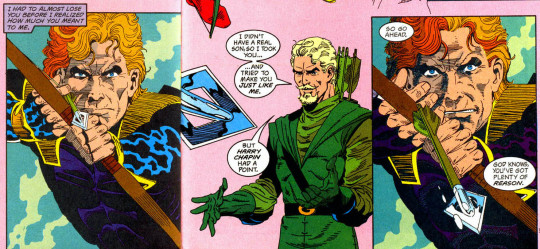
and, after this whole ordeal is done, this is how they part ways:
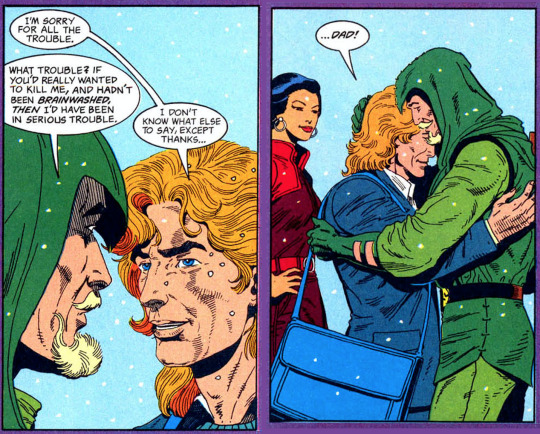
by this point, roy already has lian and a life of his own. he’s gone back to being speedy and then arsenal, he’s in the titans again and he will become a renowned hero in his own right. he might have forgiven ollie a long time ago, but now that he has found himself – like he set off to do at first – he seems more prepared to make amends and see where he stands with him (maybe i’m attributing more consistency among these issues, that happen years apart, than we should actually give them credit for, but i can’t help trying to find the common themes.)
after these, which are the most immediate interactions after snowbirds, we have multiple instances of them being close again. it’s in every small moment they have together, really, but off the top of my head, a couple that are illustrative for their relationship are green arrow: the archer’s quest and justice league of america (2006) #7, even though they don’t directly interact in this last one. i was gonna include panels from both, but this is getting long enough; i urge you to read them, especially if you followed along reading the issues i’ve mentioned, because they’re great. what i am gonna include, cause it’s amazing, is this panel from justice league of america wedding special.
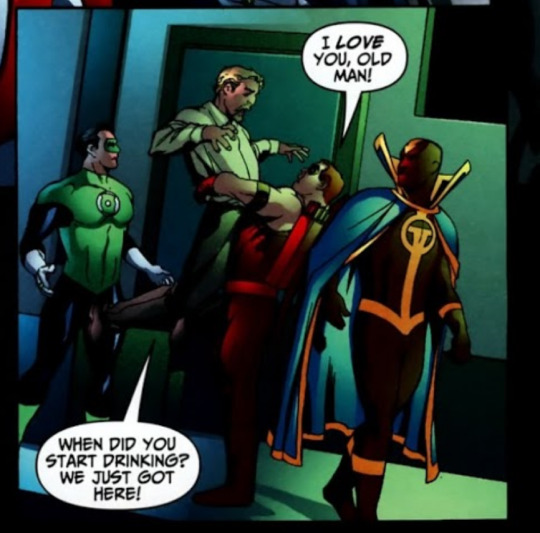
in my opinion, these misconceptions around ollie and roy not only are a disservice to their characters but also mean that people are missing out on what i think is a really interesting relationship. it’s almost rare to see a relationship evolve in a way that feels so organic in comics, not only because the interpersonal conflict here is shown to have real, tangible consequences but also because the characters are allowed to grow in a way that is gradual and natural and even satisfying.
ollie and roy's relationship might have never been the exact same after snowbirds – but which father-son relationship stays the same after the son grows up? and i think it's a testament to the strength of their bond that without ever ignoring these events (because, as i’ve shown, they’re very much acknowledged again and again) they not only never stop loving each other, but are also able to keep building something meaningful going forward.
#roy harper#ollie queen#green arrow#dc#dc meta#drug mention //#long post //#i was gonna put this under a read more but u know what. i'm not gonna give u the option to scroll past this. you are forced to read it#not really but u know hgsdhghsj#you'll notice how many times they call each other dad/son in these panels and that wasn't even intentional#not to keep comparing this to u know who but u know who could never
577 notes
·
View notes